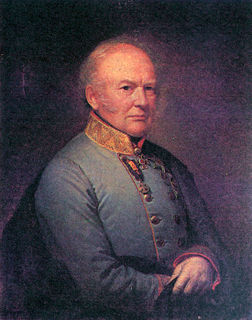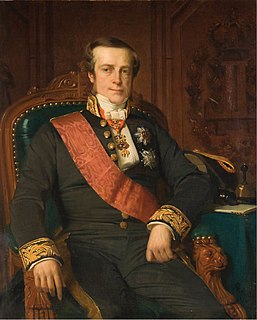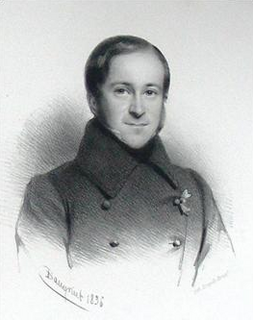 W
WAndrew Willoughby Ninian Bertie was Prince and Grand Master of the Sovereign Military Order of Malta from 1988 until his death in 2008.
 W
WSaturnino Calderón de la Barca y Collantes was a Spanish noble and politician who served as Minister of State from 1858 to 1863, during the reign of Queen Isabella II of Spain and in a cabinet headed by Leopoldo O'Donnell, 1st Duke of Tetuan.
 W
WAndrew Stanislaus Ciechanowiecki, Dąbrowa Coat of Arms, was a Polish-British nobleman, diplomat, prisoner and agent of Communist Poland, economist, academic, art historian, philanthropist, art collector, antique dealer, antiquarian and exhibition curator. He was considered an authority on French baroque sculpture in the second half of the 20th century.
 W
WKarl Ludwig, Count of Ficquelmont was an Austrian aristocrat, statesman and Field marshal of the Austrian Imperial army of French noble origin.
 W
WFranz Joseph Otto Robert Maria Anton Karl Max Heinrich Sixtus Xavier Felix Renatus Ludwig Gaetan Pius Ignatius von Habsburg, also known by his traditional royal title of Archduke Otto of Austria, was the last crown prince of Austria-Hungary from 1916 until the dissolution of the empire in 1919, a realm which comprised modern-day Austria, Hungary, Bosnia and Herzegovina, Croatia, the Czech Republic, Slovakia, Slovenia, and parts of Italy, Montenegro, Poland, Romania, Serbia and Ukraine. He became the pretender to the former thrones, head of the House of Habsburg-Lorraine, and sovereign of the Order of the Golden Fleece in 1922, upon the death of his father. He resigned as Sovereign of the Golden Fleece in 2000 and as head of the Imperial House in 2007.
 W
WEugène François Charles Joseph Lamoral de Ligne d'Amblise et d'Epinoy, 8th Prince of Ligne and of the Holy Roman Empire was a Belgian diplomat and liberal politician.
 W
WJules Edouard Xavier Malou was a Belgian statesman, a leader of the clerical party.
 W
WDom Pedro II, nicknamed "the Magnanimous", was the second and last monarch of the Empire of Brazil, reigning for over 58 years. He was born in Rio de Janeiro, the seventh child of Emperor Dom Pedro I of Brazil and Empress Dona Maria Leopoldina and thus a member of the Brazilian branch of the House of Braganza. His father's abrupt abdication and departure to Europe in 1831 left the five year-old as emperor and led to a grim and lonely childhood and adolescence, obliged to spend his time studying in preparation for rule. His experiences with court intrigues and political disputes during this period greatly affected his later character; he grew into a man with a strong sense of duty and devotion toward his country and his people, yet increasingly resentful of his role as monarch.
 W
WDon Joaquín Roncali y Ceruti, 1st Marquis of Roncali, Grandee of Spain was a Spanish noble and politician who served as Minister of State in 1868. Roncaly ceased in his post because of the Spanish Glorious Revolution, which deposed Queen Isabella II of Spain.
 W
WViscount Charles Ghislain Guillaume Vilain XIIII was a Belgian politician, serving as governor of East Flanders, Minister of Foreign Affairs and President of the Chamber of Representatives of Belgium.